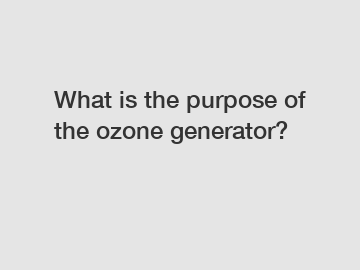Jan. 05, 2024
Machinery
Quanju Product Page
What is the Purpose of the Ozone Generator?
In recent years, there has been a growing interest in the use of ozone generators for various applications. Ozone generators are devices that produce ozone, a highly reactive form of oxygen, which is widely used in industries, homes, and healthcare settings. This article aims to explore the purpose of ozone generators and how they are utilized in different fields.

What is Ozone and How is it Generated?
Before diving into the purpose of ozone generators, it is important to understand what ozone is and how it is generated. Ozone (O3) is a molecule composed of three oxygen atoms. It is naturally present in the Earth's upper atmosphere, where it plays a critical role in shielding the planet from harmful ultraviolet (UV) radiation.
At ground level, ozone is created through a process called ozone generation. This process typically involves the use of an ozone generator, which produces ozone by passing electrical currents through the air or liquid containing oxygen. The oxygen molecules (O2) are split apart, and the resulting individual oxygen atoms combine with nearby O2 molecules, creating ozone.
Purification and Air Treatment.
One of the primary purposes of ozone generators is air purification and treatment. Ozone has a unique ability to neutralize odors and eliminate airborne pollutants such as bacteria, viruses, and mold spores. Ozone generators emit ozone into the air, where it reacts with these pollutants, breaking them down into harmless substances.
Ozone generators are commonly used in environments where air quality is crucial, such as hospitals, laboratories, and cleanrooms. They effectively disinfect and deodorize the air, minimizing the risk of contamination and creating a healthier living or working environment.
Water and Wastewater Treatment.
Ozone generators are also widely used in water and wastewater treatment processes. Ozone's strong oxidation properties make it an effective disinfectant and sanitizer. When ozone is injected into water, it reacts with various contaminants, including bacteria, viruses, and organic compounds. It breaks down these pollutants, eliminating them from the water.
Water treatment plants often employ ozone generators to ensure the quality and safety of drinking water. Ozone can effectively neutralize harmful substances like pesticides and pharmaceutical residues that are not effectively removed by conventional water treatment methods.
Food and Beverage Industry.
The food and beverage industry extensively utilizes ozone generators for various purposes. Ozone is a powerful disinfectant that can kill bacteria, viruses, and fungi on food processing equipment and surfaces. Ozone treatment is commonly used to sanitize food contact surfaces, extend the shelf life of certain products, and improve the hygiene of processing facilities.
Additionally, ozone is utilized for the disinfection of water in the production of bottled water, fruit juices, and other beverages. It helps maintain the microbiological quality and safety of the final products.
Closing Remarks.
In conclusion, ozone generators serve diverse purposes across different industries and settings. From air purification to water and wastewater treatment, ozone's strong oxidation capabilities and disinfection properties make it a valuable tool. However, it is crucial to remember that ozone can be harmful at high concentrations, and proper precautions must be taken when operating ozone generators.
If you have any inquiries or would like to explore the applications of ozone generators further, please do not hesitate to contact us. Our team of experts is ready to provide you with the necessary guidance and information.
Click here to get more.
Want more information on ozone generator for agriculture? Feel free to contact us.
If you are interested in sending in a Guest Blogger Submission,welcome to write for us!
All Comments ( 0 )